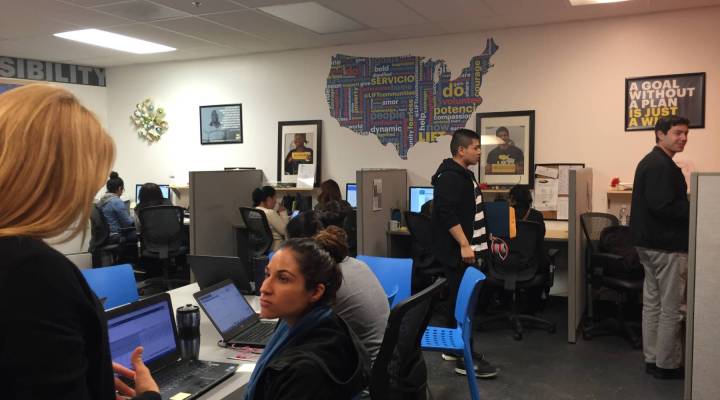
Where to turn when there’s nowhere to turn
Where to turn when there’s nowhere to turn

When an economic emergency strikes, many people have nowhere to turn. More than a quarter of people who responded to our Marketplace-Edison Research Poll said it would be “very difficult” to pay an unexpected expense of $1,000. Many of them said they don’t have a friend or family member they could turn to for help.
When someone is struggling to buy food, pay for childcare or come up with rent, there are often community and government services to help—even if they sometimes take a while. But unexpected emergencies like a car breaking down or a child needing emergency dental work often require cash.
Mehrsa Baradaran, a law professor at the University of Georgia and author of the book, “How the Other Half Banks” about limited financing options for the poor, said since so many people are living so close to the edge, one emergency expense can push them over. Baradaran said that’s especially true for minorities.
“African-Americans and Hispanics have been left out of professional jobs for many years through racism, and also recently I think racism is less to blame and it’s more just systemic poverty,” she said.

Baradaran said because poor communities often lack access to banks, many people turn to payday or car title loans in an emergency. These loans typically carry much higher interest rates than loans from traditional banks.
Our poll found that while only 14 percent of respondents overall said they had ever used a payday loans, that number jumps up to 22 percent for African-Americans and 17 percent for Hispanics.
Unless friends and family can help, Baradaran said there are few other options for direct cash transfers or small loans.
“There are a couple of organizations,” she said. “There aren’t nearly enough to meet the demand. There are some online peer-to-peer lenders and lending clubs. But, at this point, that is not hugely accessible to these folks.”

One such program exists in Los Angeles at a community service organization called LIFT. The group usually directs its clients — the group calls them members — to things like housing and food assistance.
Lorraine Perales works there, and said a $1,000 expense would be impossible for most of the people who come in for services.
“With our members, even with myself, that’s a huge amount,” said Perales. “As it is, if they work paycheck to paycheck, it’s a difficult thing.”
Perales works weekly with 38-year old Iris Henriquez, who had such an emergency. Henriquez has two kids and works 10-12 hours a day. Last year, a paperwork mix-up caused her to lose her food assistance and her job cut her hours. That put Henriquez behind on rent.
Iris Henriquez with her LIFT advocate, Lorraine Perales.
“She said that she was really worried because she was going to be evicted,” recalled Perales of the situation. “So she tried looking for people to help her — her friends and other family members that she knew of — and they weren’t able to help her for the rent.”
Of the people in our poll who said it would be hard to pay an unexpected expense, half said they didn’t have a friend or family member they could turn to for help. But just as Henriquez was about to be evicted, LIFT was in the midst of a pilot program to provide cash for emergencies. The staff called around and scrounged up enough money to cover a month of rent.
Henriquez broke into tears when recalling how it felt to receive the gift.
“I didn’t know I was going to get any help with rent,” said Henriquez, speaking through a translator. “I cried, and until now, I’m still crying. I’m really happy and really grateful.”
Having that place to stay let Henriquez get a second job, and now she’s working on building her savings. She comes to LIFT every Thursday morning for financial counseling, but she still feels like she’s barely holding on to her financial security.
On a recent visit, she said she was nervous about yet another unexpected expense. One of her kids broke his finger the day before and she had to take him to the emergency room. She didn’t know how much it was going to cost — or how she was going to pay for it.
There’s a lot happening in the world. Through it all, Marketplace is here for you.
You rely on Marketplace to break down the world’s events and tell you how it affects you in a fact-based, approachable way. We rely on your financial support to keep making that possible.
Your donation today powers the independent journalism that you rely on. For just $5/month, you can help sustain Marketplace so we can keep reporting on the things that matter to you.












